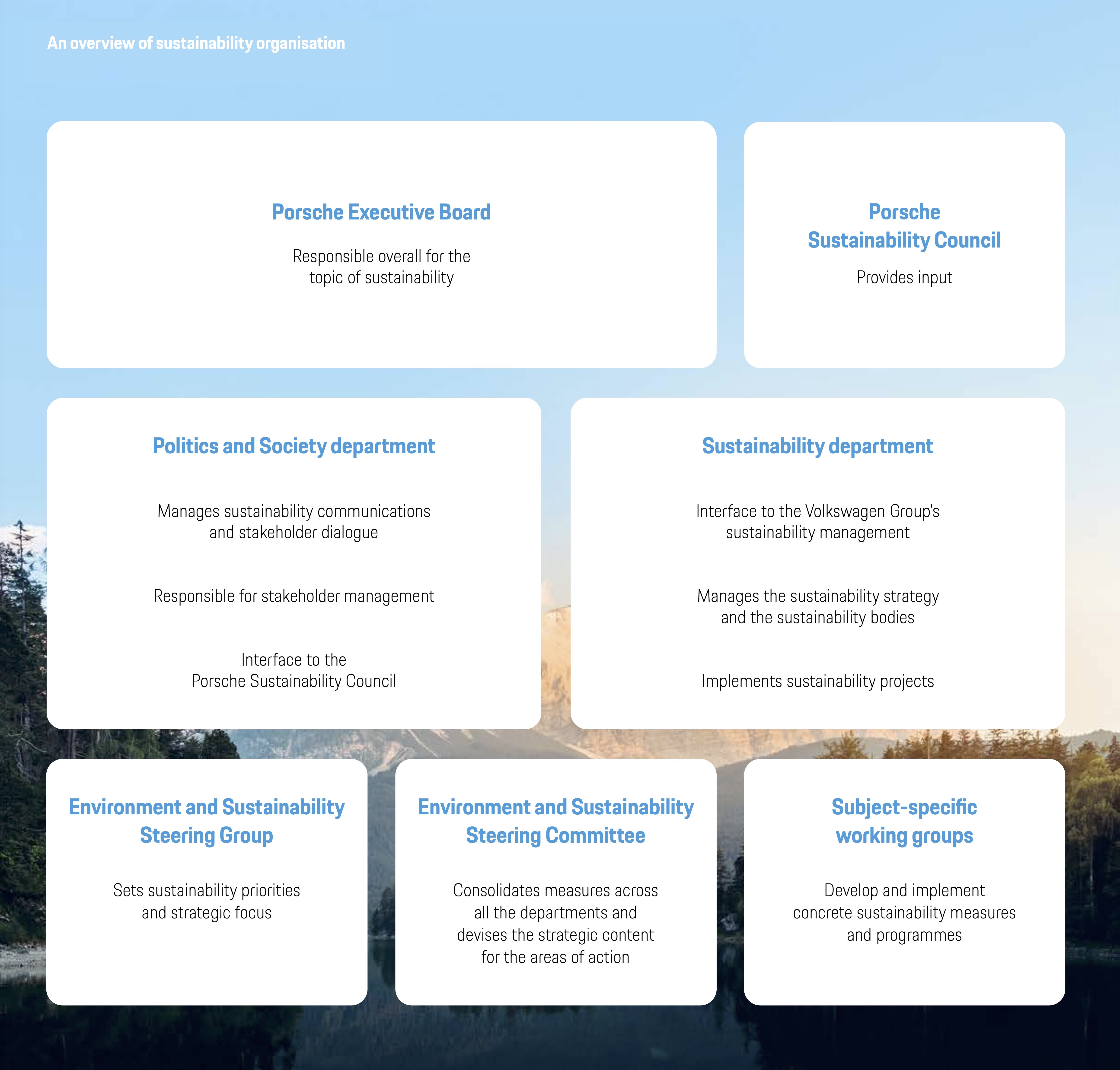Porsche’s sustainability organisation is established throughout the company. A transparent internal structure with defined responsibilities allows material topics to be handled consistently and effectively.
Sustainability is enshrined as a central cross-cutting issue in Porsche’s Strategy 2030. Responsibility for this lies directly with the Chairman of the Executive Board, with additional support from the Member of the Executive Board responsible for Production and Logistics and the Member of the Executive Board responsible for Procurement.
Porsche’s sustainability organisation is established throughout the company.
A transparent internal structure with defined responsibilities allows material topics to be handled consistently and effectively. This is underpinned by the Group’s sustainability guidelines, which contain binding rules on organisational processes, topic management, project implementation, and communication of all sustainability topics.
The Executive Board of Porsche AG is the highest authority with regard to sustainable company development. It determines the fundamental strategic direction and concrete sustainability targets in regular strategy workshops. It also decides on the realisation of far-reaching sustainability measures and flagship projects.
The Sustainability department within the General Secretary and Corporate Development division is responsible for the sustainability strategy and its continued development.
It realises sustainability projects and manages the company’s sustainability bodies. In line with the Volkswagen Group Sustainability Guidelines, it also serves as the interface with the Volkswagen Group, where it represents the Porsche brand’s sustainability management.
In addition, the Politics and Society department of the Communications, Sustainability and Politics division is responsible for internal and external sustainability communications, non-financial reporting and stakeholder management. It engages in sustainability networks. The office of the Porsche Sustainability Council and project management for all activities relating to the Value Balancing Alliance are also located here.
The Environment and Sustainability Steering Committee is a cross-departmental body comprising representatives of all the relevant departments. It determines and consolidates the direction and content of the sustainability strategy, for its subsequent adoption by the Environment and Sustainability Steering Group. The Steering Committee makes decisions regarding the roadmap and objectives within the sustainability strategy. It also forms working groups to prepare, evaluate and refine topics, projects and initiatives relating to sustainability. It generally holds bimonthly meetings and reports to the Steering Group above it.
On this basis, the Environment and Sustainability Steering Group determines the focuses and direction of the sustainability strategy, which are then presented to the Executive Board to be decided upon. The Steering Group is composed of the heads of the main divisions and can be expanded flexibly as required. It addresses all the topics conducive to the development and creation of the sustainability strategy and commissions the Environment and Sustainability Steering Committee with preparing and coordinating topics, projects and initiatives relating to sustainability. The Environment and Sustainability Steering Group meets once a quarter and provides regular reports to the Executive Board.
Another key body is the Porsche Sustainability Council, which has been guiding the company into a more sustainable future since 2016. Here, external specialists from the fields of business, science, politics and civil society advise the Executive Board and top management regarding the strategic focus of sustainability. The Council members are independent and not bound by instructions. The Executive Board has given the Council far-reaching rights to information and consultation, as well as rights of initiative. Since the beginning of the year under review, this advisory body has consisted of Council spokesperson Lucia Reisch and Council members Sarah Jastram, Raffaela Rein, Adnan Amin, Ortwin Renn and Klaus Töpfer. The advisory body is also supported in its meetings with the Porsche Executive Board by Nicola Leibinger-Kammüller as an industry partner. She contributes her many years of business experience.
The Sustainability Council held two meetings with the Porsche Executive Board in the year under review. The key topics addressed included decarbonisation, ESG management, sustainable supply chains and human rights. Council members additionally held regular meetings with the Sustainability Council office and with Porsche experts. In regular videoconferences, members of the Council were closely involved in further development of the sustainability strategy and the deepening of stakeholder dialogue.



